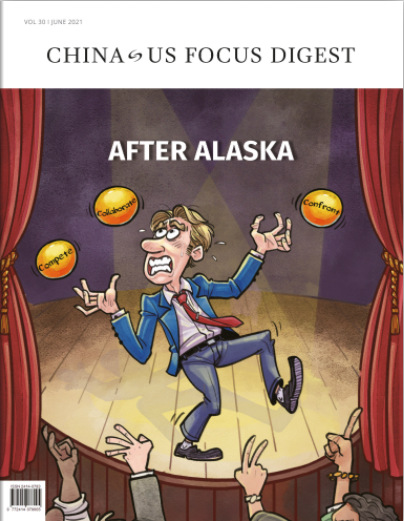Click to read the latest China-US Focus Digest
As geopolitical tensions between Beijing and Washington continue to rise, the Western Balkans remain a swing region that is desperate for foreign direct investment and political commitments from great powers. Although the European Union invests significantly in the Western Balkans, its contributions have not been enough to generate material change with positive, lasting economic effects for the middle class. In response, China has invested heavily in strategic infrastructure, sometimes generating decent jobs and productive economic activity.
However, Europe does not need to negotiate with China from an adversarial position, but should offer the Western Balkans a competing economic and investment narrative that can counterbalance the region’s dependence on China’s FDI. Since global supply chains must shift due to the coronavirus pandemic and geopolitical tensions, the European Union should think strategically and combat Chinese investment in the Balkans from a position of healthy competition. The winner here is obviously the Western Balkans, since its countries can negotiate with a diverse set of investors from both sides of the geopolitical aisle. Europe could move more production to the Western Balkans to create a greater investment balance in the region, while incentivizing European integration, regional democratization, and strengthening Western Europe’s political influence in the region.
Everyone understands why China is in the Balkans – nations and political parties are desperate for external aid and investment to finance crucial strategic infrastructure, labor costs are relatively low, the population is educated, consumption rates are increasing, and most importantly, shipping and transport routes in the Balkans head westward to the even more desired markets of Western Europe. For the Chinese, working closely with Central, Eastern, and Southeastern Europe is an obvious win-win.
However, the European Union can react to Chinese involvement in the Western Balkans by assisting neighboring nations with investment and infrastructure gaps, while simultaneously securing its interests.
The Western Balkans are geographically close to the EU, cutting transport costs and making for easier compliance checks or European regulations. Nearshore production zones also reinforce Europe’s climate goals by reducing carbon emissions.
These ideas were emphasized in the recent paper ‘Time to move to the Western Balkans: How diversification of global supply chains can benefit EU resilience,’ where authors Zoran Nechev and Marie Jelenka Kirchner examine European market dependence on China and how this affects the EU’s relationship with the Western Balkans. The analysis places Europe’s autonomous and strategic independence at the center for why the European Union should work to shift supply chains to the Western Balkans instead of allowing increased Chinese activity in the region. The EU seeks economic independence but also hopes to expand, this is particularly important for the Franco-oriented thinkers of the EU. To bounce back from the pandemic, they argue that Europe needs diversified supply chains to forge a sustainable path forward.
Shifting firms and exports to the Western Balkans links two EU macro policies, specifically, economic independence of the EU and the Union’s enlargement in the Western Balkans.
The coronavirus pandemic revealed many things about the China-EU relationship and illustrated the practicality of such a shift to the Western Balkans. First, Beijing remains the EU’s greatest source of imports, and the trade deficit keeps Europe dependent. Second, how to handle ‘Europe’s dependency’ on China creates a series of diverse policies, which destabilizes Europe’s united ‘foreign policy’ on China. Third, and most importantly, the coronavirus pandemic revealed the risks associated with globalized supply chains and single sourcing strategies rooted in Asia. By reorganizing and diversifying supply chains, the Western Balkans could become an EU-wide production zone and export destination to reinforce the Union’s resilience during similar crises.
But in reality, questions of dependence are not just related to the Balkans. In 2019, 19 percent of EU imports originated in China, and 9 percent of exports went to China. The China-EU trade deficit sat at around 164 billion euros. When we observe the European automotive industry, more than 80 percent of the supply chain is linked to China for manufacturing parts, production, and rare earth minerals. Although rare earth minerals will remain out of reach for many European firms, they can shift portions of their supply chains closer to home while keeping the Western Balkans in mind. The overall European dependence on Beijing should be considered, because it directly affects relations between the U.S. and China, and everyone else involved in the supply chains.
European firms could work to begin multi-sourcing materials, especially since geopolitical tensions between China and the U.S. will increase. At least somewhat ‘localizing’ European supply chains would minimize costs, cross-border risks, and time.
A German diplomat recently expressed fear that the EU risks ‘losing’ the Western Balkans to China over economic and investment dependence. The countries of most concern are nations that are eyeing European Union membership, specifically, Montenegro, North Macedonia, and Serbia. European Union leaders fear that Chinese investment and credit for infrastructure projects could lead to massive debt traps, forcing countries to give up collateral and control of strategic infrastructure like highways, bridges, and power plants. China does not require feasibility studies or environmental impact assessments.
If the European Union hopes to remain a geopolitical power it will need to help the Western Balkans with further investment in infrastructure and health systems, especially since the coronavirus pandemic. The EU did assist the region with billions of euros in economic support, but the rollout was uncoordinated.
Each nation should evaluate its historical relationship with both the European Union and China. The current level of Chinese activity should not diminish unless the European Union steps up its economic and investment activity. Each country should evaluate its diplomatic, economic, and investment needs in the context of a strategy for the next 20 years. These strategies should incorporate plans for increased engagement with the European Union, China, and the United States.

